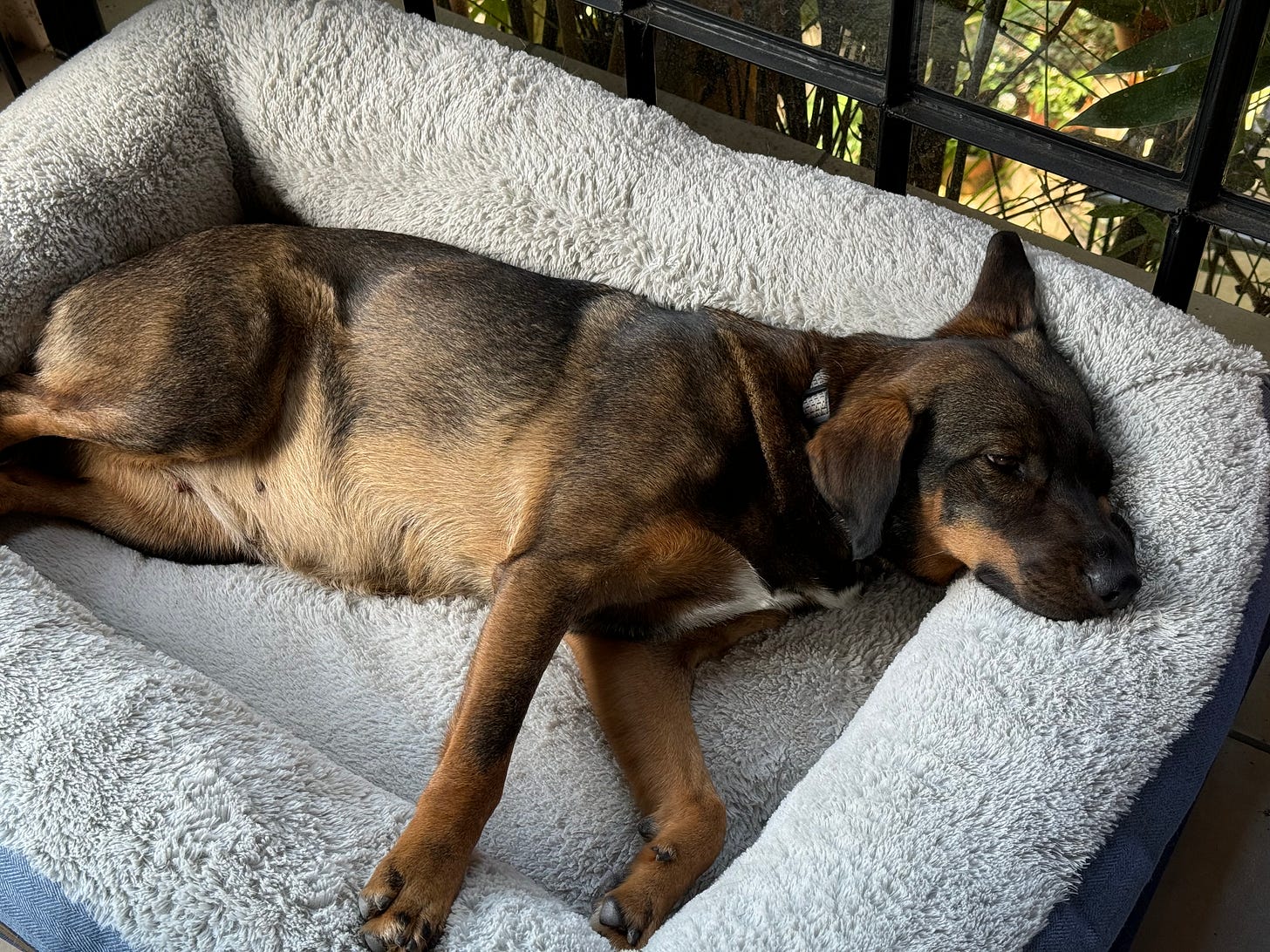Over the past year, Andrea and I have spent quite a bit of time driving around the Valles Centrales, Oaxaca’s central valleys. It’s where we live, where the city of Oaxaca de Juárez is located, and also where the majority of the state’s people (by density) are found. Unless you’re specifically here to visit Oaxaca’s beaches (which for most people means Puerto Escondido or one of the other towns nearby), visiting Oaxaca means visiting these valleys.
We desperately want to see more, though, of both Oaxaca and Mexico. After all, it was our multiple visits to Mexico City that first made us consider the possibility of a life in Mexico. So when two of our best and oldest friends, Stu and Alisha, told us they were moving to Mexico City with their children, we knew we finally had a great excuse to visit again.
Mexico City is remarkably accessible to us, a mere 40-minute flight. We knew ahead of time, though, that we would be driving, both because we’ve never made this particular trip before and because both Mexico City and the nearby city of Puebla are home to IKEA and Costco, two places we want to buy supplies from before the arrival of our son in November.
If the idea of a road trip in Mexico sounds intimidating to you, well, it does to us too. The road which leads from Oaxaca to Mexico City is a cuota—a toll road—and it’s the same one we took to get to Santo Domingo Yanhuitlán, the town where the incredibly skilled and welcoming Reyes family lives, from whom we have purchased several pieces of art.
While driving on the cuota isn’t difficult, it’s not entirely without its risks. Many years ago Penny and Victor lost three friends in a terrible car crash on this same highway, and many of the road’s overpasses have guard rails that are short enough to prove anxiety-provoking. It’s one thing to know that you could get into a collision—a risk on any road that doesn’t have a barrier or median—but it’s another to picture yourself careening off the side of an overpass into a chasmous ravine.
It’s not the risk of physical danger that worries me, though. I’m far more perturbed by the strong possibility we’ll be stopped by highway police (Federales!) to be asked for a bribe.
We’ve lived in Mexico for just over a year now and the great, formless fears about Mexico which live in the minds of so many Americans have largely been slain. Yes, this is a place with real dangers. For example, right now the Mexican state of Sinaloa is in a state of open cartel warfare. But Mexico is also geographically huge with a population of over 127 million people. Not all of Mexico is gripped by violence, nor is it a place defined by violent people. In our town, you can walk alone at night, in places without street lamps, and you won’t be attacked, mugged, or otherwise hassled.
What does happen here are highway stops by police officers explicitly looking for bribes, and the cuota road is, sadly, quite infamous for this. Two friends, who for privacy reasons will remain unnamed here, drilled home the likelihood of this with a dramatic recounting of their own story.
Our friends are a married couple, one Mexican and one from another country, and the Mexican partner has little tolerance for corruption. Believe it or not, this is how most Mexicans seem to feel. Even though this country is gripped by corruption it’s not something people like, or even approve of, and Mexicans hate being subjected to this type of manipulation and corruption. So when our friends were driving on the cuota road and were stopped by a Federale looking for a bribe it was a particularly frustrating turn of events for them.
Imagine a car pulled to the side of a dusty, high-altitude highway carving its way between mountain passes covered in pine trees. The Federale walks up to the driver’s side of the car and manufactures some flimsy reason for why he’s pulled over their vehicle. The fine, he begins to say sadly, is quite high, but they can save themselves some trouble, and get it discounted, by simply paying it now rather than having to send it in via mail or, god forbid, going to the police station to pay it in person.
Suddenly, one of our friends interrupts the officer while he’s mid-sentence.
“Just tell us how much money you want, man!”
The officer looks surprised, but, in his heart, he’s entrepreneurial, and in a position of power. Without more pretense, he names a price—a high one—and soon our friends have forked over their cash.
Unexpectedly, and perhaps motivated by some minor sense of shame, the officer says to them, “How are you going to pay the toll that’s coming up?”
“You tell me, you just took all of our money!” our Mexican friend says to him, while his partner, who is sitting in the passenger seat, look at him with horror.
The officer thinks for a moment but is prepared. “I’m going to write you a note,” he says, “which says that you’ve already paid. Just show this to the toll attendant and any other officers who pull you over and they’ll let you go.”
Our friends look at each other, mystified, as the officer saunters back to his car. Soon he’s gone and our friends are safe to continue their drive.
Back on the highway, our friend in the passenger seat looks at the slip of paper to find it contains not just the amount they paid, but a password.
It’s one thing to be asked for a bribe, which is an irritating but perhaps inevitable part of living in Mexico, but it’s another to be given a receipt for your shakedown. It makes it worse, somehow.
I thought about our friends’ story for a long time, the particular details of it percolating in the back of my mind, slowly bubbling like a wintertime stew left on the back burner of a stove during a snowy day.
At first, I thought what makes the detail of the receipt so awful and funny is that it shows the degree to which corruption has been so institutionalized here in Mexico. Writing a receipt for a crime doesn’t just show a complete lack of concern for getting caught, it signals that a huge number of people are also intimately involved in the scam. This is the behavior of a cartel, not just a random guy trying to squeeze extra money out of people, and that’s worrying.
But as the narrative burbled in the background of my life, I came to realize that, perhaps, what makes it so terrible isn’t the theft, or the sheer ludicrous nature of the entire experience, but rather that the entire situation is so purely capitalistic. A trusted figure with the ability to severely and negatively impact someone’s life subjects them to psychological abuse, literally robs them, and then also acts as if he’s doing them a favor. In his mind, he’s generous; benevolent even. What could be more capitalistic than that?
For me, it was yet another reminder of why I had wanted to leave the United States. Substitute the cop for the CEO of a company I used to work for and you’d think the two guys could be brothers. The cop’s behavior, a self-satisfied robbery, was not all that different from the CEO’s smug, brittle self-congratulatory nature that was on display during the mandatory and ghoulish all-hands-on-deck meetings the company would routinely subject its employees to.
In the face of such memories there’s nothing to do but smile ruefully, shake your head, and be glad you moved to another country.
The odds are good we’ll complete our trip without any issues, and in the event we are pulled over we know how to handle ourselves. But even if we are stopped, it will be a small price to pay to be able to see our friends and fill our car (and coolers) with treats from the big box stores in Puebla.






Thank you for dispelling the generally irrational fears people have of Mexico. It's much safer than the US and realistically not far off Europe 🙏🏼
I'm glad you enjoyed your trip! It IS a long drive so well done for making it to IKEA (worth bringing the car I'd say 👏🏼).
It's unfortunate that your friends paid the bribe. The one time we were stopped and asked for money (a donation) we just wasted their time and they let us go.
I love this story of a friend of mine - He is an American but has lived in Mexico for 30 years with his Mexican partner. He is fluent in Spanish. He got stopped once (apparently he did commit some kind of infraction) and the cop wanted a bribe. He says to the cop, "What is that on your sleeve?" The cop looks at his sleeve, bewildered. My friend says, "The Mexican Flag! You should be ashamed!" The cop let him go.